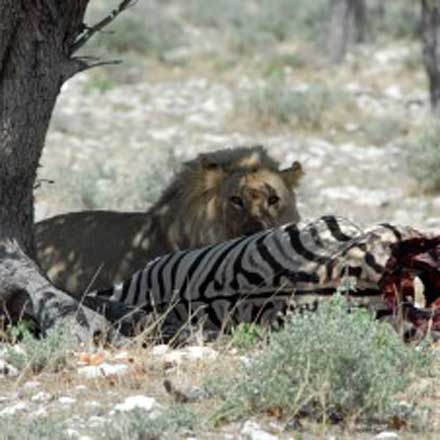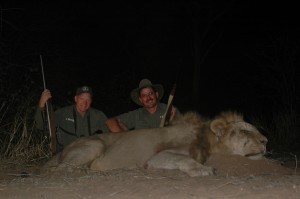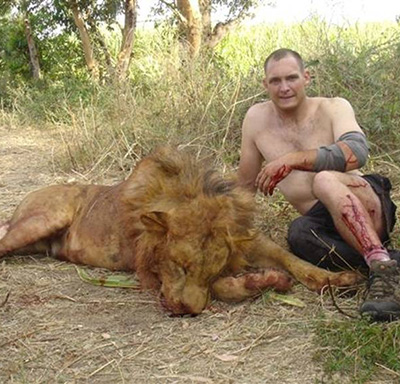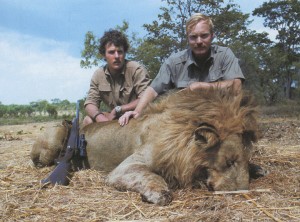
I am scared to death of lions. I’m cautious around buffalo, but I’m not afraid of them. Elephants have my undying respect, and anyone who isn’t scared half to death in the middle of a herd of cow elephants isan idiot. I’m not the least bit afraid of a leopard when he comes onto a bait, or on the few occasions when I’ve seen one slipping through the bush. Nor is there any reason to be afraid under such circumstances. When I’ve had to follow a wounded leopard into the thick stuff, well, then I’m terrified, and have every right and reason to be. But with lions, well, I’m scared of them all the time.
Perhaps this was why more than 30 years ago, it was the dream of facing a lion that most made me want to go to Africa. I’m sure many of us have that dream for the same or altogether different reasons. The lion is, after all, truly a symbol of wild Africa. As Robert Ruark put it when writing about his own first safari, it comes down to man’s ability to slay a lion.”

In today’s Africa, unfortunately, this can be a distant dream. Shrinking habitat and increasingly limited viable lion areas have made a lion safari the most costly option of all in today’s Africa. Regrettably, I seriously doubt this will get better. Permits are sharply limited wherever lions are hunted. Serious lion recovery efforts are underway in many parts of Africa, and while it could go either way, the lion, given a chance, is a prolific breeder. There may come a time when there are more permits available, but I am sure we will never return to a time when a lion is part of the bag on a normal, average safari.
The lion has long been hated and feared by man. There is that innate dread of a creature that not only can, but occasionally will eat us. There’s also the practical reality
that humans raise cattle and other livestock, and lions among the cattle is a serious problem. Lions were once quite plentiful across much of the continent. In East Africa, where the traditions of safari hunting were established, lions and leopards were considered vermin, long after most other species were placed on license with limits and fees. Within living memory, it was common and legal for...
hunters who so desired to take more than one lion on a single safari—and most who dreamed of a lion went home with one.
My uncle, Art Popham, went on safari in Tanganyika in 1956. He took two gorgeous lions, not unusual back then. I was about four years old, and that was when I started dreaming about hunting a lion for myself. It was 21 years later, in 1977, when I tried for the first time. By then, it was pretty much one to a customer, and although the fees seemed plenty high for me at the time, by today’s standards they were laughable.

At that time, a lion permit was generally part of the menu on the average safari in most of countries then open. Even so, things had started to change…I just didn’t know it. Like the generations of Africa-bound hunters who preceded me, I fully expected to take a lion on that safari. This was the closing days of Kenya, and I didn’t know that success on lion had dropped dramatically, at least in that country at that time. We turned down a couple of young males, but I didn’t get the lion I so badly wanted. Perhaps if I’d gone to newer destinations like Botswana or Zambia, I’d have had better luck. Perhaps it’s just as well, because not taking a lion and still wanting one gave me a chance to go back.
I tried a couple more times before I took my first lion in Zambia in 1983. With lion hunting now so costly and so specialized, it seems odd. But just 20 years ago, the possibility (if not probability) of a lion was there on almost any safari into dangerous game country. That first lion wasn’t the lion of my dreams, but the one I took a year later, also in Zambia, definitely was. Through the 80s, there were other chances—and then things changed quickly. The next-to-last chance I had at a wild lion was in 1996, in Central African Republic. We’d heard two males roaring through the night, and we bumped squarely into them shortly after leaving camp at dawn. Both were nicely maned males, probably brothers hunting together. It was an “open” area, meaning the quota wasn’t restricted. I could have shot either quite easily, but we were hunting bongo. I’d had my chances at lion, and it seemed much too cheap to take this...
chance encounter.

So we passed and within a few years, the odds of having a crack at an incidental lion dwindled to be like winning a lottery. I didn’t need another lion, but for the next decade, as it seemed increasingly likely that I would never have another chance, I must admit some wistful thoughts about those beautiful lions standing on the edge of the forest!
A couple of years ago, I won that lottery. We were gathered round the campfire in northern Namibia on the edge of Etosha National Park. One of the landowners drove in, fresh from the game department with a “problem lion” permit in his hand. We had already seen the tracks, and there were plenty of lions in the area. My plains game hunt quickly became a lion hunt, and two days later, we called in a fantastic lion, scarred and old, with broken teeth.
As much as I hate the thought, I’m fairly certain this was my last lion. That’s okay because I really have had my fair share and more. For me personally, the lion has always been the ultimate African trophy. And in real terms today, a good lion is certainly one of the continent’s most difficult as well as most costly prizes. I wish I could turn back the clock because the palm-sweating, chest-constricting fear I feel in the presence of a lion remains among the greatest thrills in my hunting life. Of course I can’t, but I sincerely hope the lion remains a possible prize for the next generation of African hunters. Africa will be a poorer place when we cannot hear the lions roar or ponder our own ability to “slay a lion.”